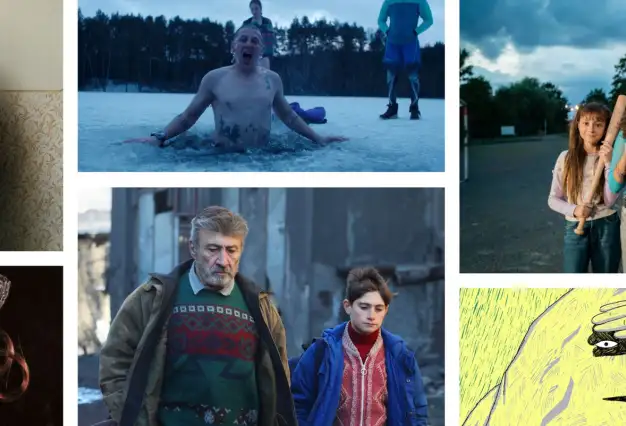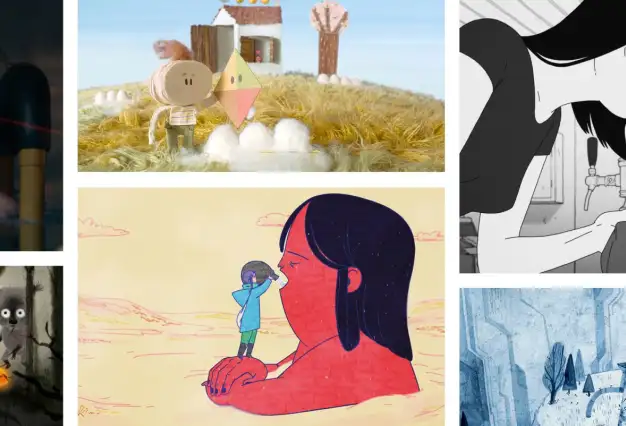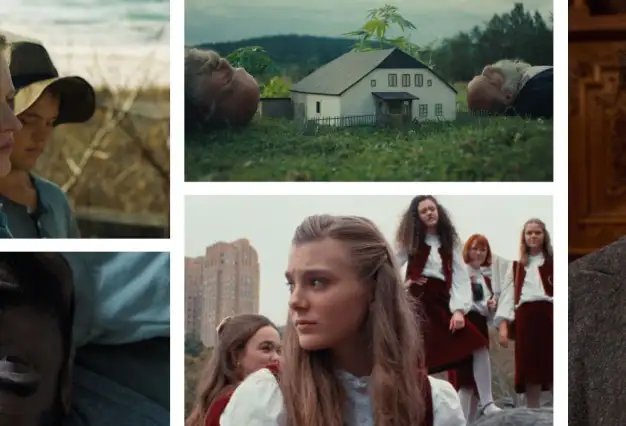
19 August 2025
San Sebastian 2025: Omerzu's homecoming, Kafka's ascent
San Sebastian 2025: Omerzu's homecoming, Kafka's ascent

At the 73rd edition of the San Sebastian International Film Festival, Czech cinema returns to the main competition with renewed strength and international ambition. Olmo Omerzu revisits to the festival where his breakthrough Family Film debuted a decade ago, world premiering Ungrateful Beings, a family drama that sharpens his ongoing exploration of generational disconnect and modern parenting. Alongside it, Franz, the latest film from Oscar-nominated director Agnieszka Holland, offers a genre-defying, impressionistic portrait of Franz Kafka, in its European premiere.
by Martin Kudláč for CZECH FILM / Fall 2025
Over the past decade, Spain’s largest film gathering, the San Sebastian IFF, has steadily hosted Czech cinema. From early breakthroughs in the New Directors competition and Zabaltegi-Tabakalera to the official selection premiere of Petr Václav’s Il Boemo in 2022, San Sebastian has provided a springboard for Czech filmmakers to test the international waters, whether with auteur-driven period epics, hybrid coproductions, or daring shorts from burgeoning young talents. Yet the festival’s importance to Czech cinema stretches back still further. In 2005, Bohdan Sláma’s Something Like Happiness won the Golden Shell for Best Film, with Aňa Geislerová taking Best Actress, signaling significant international recognitions for modern Czech filmmaking.
While Il Boemo, Václav’s long-gestating portrait of Czech-born composer Josef Mysliveček, marked a return to the main competition by a Czech director for the first time since Sláma’s win, Czech participation at San Sebastian has often been most vivid on the edges of the official lineup. The Zabaltegi and New Directors sections have welcomed a number of Czech minority coproductions in recent years, from Peter Kerekes’s 107 Mothers and Radu Jude’s Bad Luck Banging or Loony Porn to The Crossing by Florence Miailhe, each expanding the geographical and thematic bandwidth of Czech filmic creativity.
At the same time, San Sebastian’s student competition, Nest, has become a recurring launchpad for emerging Czech voices from FAMU. The almost Hanekenian Playing by Lun Sevnik, Adam Martinec’s melancholic Sugar and Salt about aging, and Damián Vondrášek’s Imprisoned have all been selected in recent years, offering glimpses of a new generation unafraid to probe psychological extremes, experiment with storytelling, and engage with contemporary social realities.
In this sense, Czech cinema’s presence in San Sebastian may appear low-key on the surface, yet its cumulative impact reflects a broader shift, from isolated entries to an increasingly integrated role within the fabric of European film production. As new talents mature and international collaborations deepen, the Spanish gathering continues to serve as a quietly strategic node in Czech filmmaking.
At the 73rd San Sebastian International Film Festival, Czech cinema makes a notable return with two ambitious selections in the competition that underscore its growing role in European auteur filmmaking. The Official Selection premieres Olmo Omerzu’s Ungrateful Beings, a sharp family drama that deepens Omerzu’s signature probing of generational tension and moral ambiguity. Also featured is Franz, the latest Czech-German-Polish coproduction by Agnieszka Holland, an unorthodox, genre-defying bio-pic about Franz Kafka, which will screen in San Sebastian following its world premiere in Toronto.
Parenting beyond the breaking point
A decade after his breakthrough at San Sebastian with Family Film in 2015, the Czech-based, Slovenian-born director Omerzu reappears at the festival with his latest drama, Ungrateful Beings, a searing exploration of modern parenthood and adolescent alienation. The world premiere of his fifth feature marks not only a homecoming to the festival that helped launch his international profile, but also the next chapter in his long-standing creative partnership with producer Jiří Konečný of Endorfilm, as the duo steadily builds a growing body of work.
Set in motion by a deceptively serene seaside holiday, Ungrateful Beings follows David, a recently divorced father played by Irish actor Barry Ward (Jimmy’s Hall, The End of the F***ing World), who takes his teenage children, Klára (Dexter Franc) and Teo (Antonín Chmela), to the Adriatic coast in an attempt to reconnect. What begins as a family reset gradually reveals underlying tensions, particularly with the 17-year-old daughter, who is recovering from eating disorder and becomes entangled with local bad boy Denis (Timon Šturbej). As a sudden act of violence disrupts the idyllic setting, the film shifts back to the Czech Republic, where David and his ex-wife, Laura (Barbora Bobuľová), attempt to support their daughter by impersonating Denis in text messages, an intervention blurring the line between care and deception.
Ungrateful Beings marks Omerzu’s most visually ambitious film to date. Working with cinematographer Kryštof Melka (Borders of Love), the director contrasts the vivid, heightened palette of the coastal holiday with the subdued, clinical tones of the family’s life back home. This bifurcated visual language reflects the film’s structural division and emotional evolution. Dialogue is delivered in a natural mix of English, Czech, and Slovak, an authentic reflection of contemporary European family dynamics and a strategic move that makes the film more accessible to international markets.
Omerzu continues his practice of combining professional and nonprofessional actors. Newcomer Dexter Franc delivers a quietly powerful performance as Klára, embodying both adolescent fragility and defiant independence. The use of an intimacy coordinator, Jana Neustupová, the first certified Czech professional in this role, reflects the director’s sensitivity in navigating difficult material safely for actors. Despite the film’s dramatic undercurrents, Omerzu resists easy sentimentality, instead focusing on the small ruptures and ethical tensions that accumulate across ordinary interactions.
Ungrateful Beings is a five-country coproduction led by Endorfilm. Konečný reunited for this project with international partners from Omerzu’s previous films, including Rok Biček of Cvinger Films in Slovenia; Mariusz Włodarski and Marta Gmosińska, from the Polish company Lava Films; Slovak producer Ivan Ostrochovský of Punkchart Films; and Ankica Jurić Tilić and Dragan Jurić of Croatia’s Kinorama. Additional coproducers are Michal Sikora of Lonely Production, Czech TV, Hélène Mitjavile and Théo Laboulandine of Melocoton Films, in France, and RTV Slovenija. The film was supported by the Czech Audiovisual Fund, the South Moravian Film Fund, the Slovenian Film Centre, the Polish Film Institute, the Slovak Audiovisual Fund, the Croatian Audiovisual Centre, CNC, and the Pilsen Region.
Kafka reimagined
Following its world premiere in Toronto, Franz, the latest film by Oscar-nominated filmmaker Agnieszka Holland, continues its festival journey at San Sebastian. A formalistically daring and genre-bending portrait of Franz Kafka, the film moves beyond the boundaries of the bio-pic to construct a richly textured reflection on the writer’s psyche and legacy. Rather than narrating Kafka’s life in chronological fashion, Holland creates a hybrid docudrama that weaves together fictional scenes, archival material, and stylized tableaux inspired by Kafka’s fiction, letters, and diaries.
Shot across Prague, Berlin, and Theresienstadt, Franz uses location as a symbolic landscape, evoking Kafka’s dislocated identity and emotional topography. Prague, Kafka’s hometown, plays both itself and a haunted echo of its former self, with Holland and her creative team capturing traces of the early 20th century in a city that has since transformed. German actor Idan Weiss, cast in the leading role, brings a contemporary, almost anachronistic sensibility to a figure too often reduced to cliché. The multilingual ensemble includes the Czech actors Jenovéfa Boková, Ivan Trojan, and Stanislav Majer, starring alongside Peter Kurth, Sandra Korzeniak, and Katharina Stark, among others.
Backed by a wide-ranging European coproduction framework, Franz reaffirms Holland’s long-standing artistic partnership with the Czech film industry. Produced by Šárka Cimbalová and Agnieszka Holland of Marlene Film Production, alongside partners from Germany and Poland, the project also reflects the growing status of the Czech Republic as an international production hub for large-scale, cross-border auteur films.




